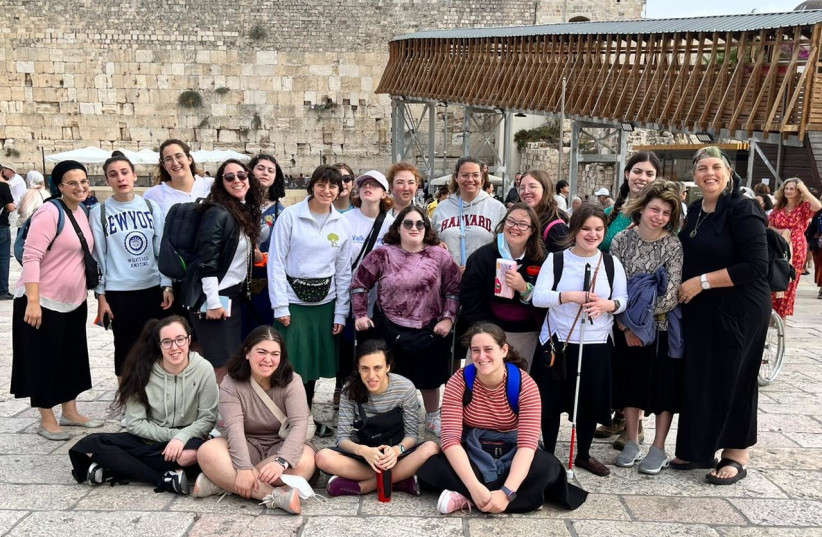“Don’t walk in front of me – I may not follow
Don’t walk behind me – I may not lead
Just walk beside me and be my friend”
Different versions of the above quote have been attributed to French playwright Albert Camus, Jewish Children’s Music personality Uncle Moishy and several others but the idea seems to resonate as it has been widely shared for decades. Sure, there are and have been some pretty spectacular leaders. We look to them for inspiration, clarity, wisdom and guidance. And good followers are often tasked with being the next generation of good leaders but are they our friends?
When I think about NAIM (North American Inclusion Month) or JDAIM (Jewish Disability Awareness and Inclusion Month), I think about what real inclusion means. As we are blessed to live at a time when most Jewish High Schoolers are aware of and engaged in chessed (acts of kindness) the refrain of “Just walk beside me and be my friend” stands out.
Are the recipients of loving kindness just passive or even active beneficiaries of someone else’s generosity? Could we change that model for something better? Booker T. Washington asserted that “those who are happiest are those who do the most for others.” When we look at those with intellectual or other disabilities as grateful recipients of the kindness of others, are we stripping them of their own value and happiness? Too often – without thinking, of course – we take away their ability to give and thereby achieve true happiness.
Why is it that friendship is the Holy Grail of relationships?
Merriam-Webster defines a friend as one who is attached to another by affection or esteem. While I have no doubt that the typically developing chessed doers and their differently-abled chessed recipients/participants hold each other in high esteem and do experience affection, the key to this definition is nuanced: what is it that “attaches” them to one another? Is he or she “my camper”? Someone “I do chessed with”? Or are they friends?

Where is our focus as we consider our relationships with people who have special needs or who experience disabilities? Chessed is the root of so much of humanity and, while the prophet Micah describes loving kindness as one of the basic tenets of peoplehood, chessed is also subjective: it requires a recipient and more significantly, it does not require a partner.
A JUST society requires so many partnerships and moving parts. Chessed almost exclusively refers to power structures. Giving to those who, for one reason or another, need my chessed. The list, as enumerated by Maimonides, includes helping the sick, the dead, orphans, mourners and others who are lacking.
Pursuing justice and equality doesn’t need to have a winner and a loser.
I am often told that “Y” who has special needs is the friendliest person in his shul and that he has hundreds of friends. My reply is always: how often is he called upon to fill the last empty seat in a car of friends heading out for a night on the town or to take the last two slices of a pie of pizza being split by three of his peers? Because that’s what real friends do.
Real friends fit. Real friends don’t have to be included or given to, or even looked up to. Real friends have to be respected and valued and shared with. Sharing is multidirectional: We find what we share (in common) and as we identify with these, we become friends. Meir Kalmanson made waves with his SuperSoul Party initiative because it doesn’t just hand out a meal or warm clothes to the unhoused, but it invites others and acknowledges (as its tagline states) that “we are all on the same team.”
Otherness is real and necessary and not offensive, but it is similarity that connects us as friends. And while it’s true that dissimilarity is what inspires so many wonderful initiatives like Chessed Projects and the SuperSoul Party, we have to be careful to not define these relationships by what makes us different.
When we actively integrate or include, we are highlighting that which doesn’t otherwise fit – necessary in many situations, no doubt. But when we think of friendships and their significance, it has to be the similarities that take center stage, creating an environment that doesn’t require inclusion in the first place.
Next time we see someone who doesn’t fit and we think of how we are more equipped to navigate this world and then offer to be a giver or a leader, take a moment and reframe. Maybe she doesn’t need a leader right now and maybe she won’t want to follow. But there is always room for us to “just walk beside... and be a friend.”
The writer is the program director of Ohr Torah Stone’s Yeshivat Darkaynu, a one-year Israel program for young adults with special needs. He lives with his wife and five children in Gush Etzion.
